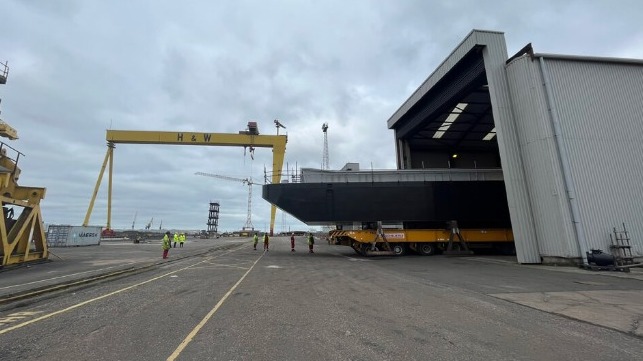Barge is First New Vessel Built at Harland & Wolff in 20 Years

Harland & Wolff, the famed Northern Ireland shipbuilder, marked a key milestone in the restoration of operations after 20 years at its Belfast yard. Once the builder of some of the world’s most famous ships, including the ill-fated Titanic, Harland & Wolff rolled out its first new ship from the building hall on February 27. While a small barge, it is part of the larger effort to ramp up operations in Belfast as well as the company’s second shipyard, Appledore in England.
The first vessel out of the fabrication hall in Belfast is a barge being built as part of a large contract with London-based Cory, an operator of barges used to haul recyclables and waste on the Thames. Harland & Wolff reported in mid-February that the first hull was approved and ready to be moved to the painting hall.
Cory placed a first order with Harland & Wolff in June 2022 valued at approximately $10 million for the fabrication of 11 barges. A month later they placed a second order for a further 12 barges. Harland & Wolff reports the second barge is in an advanced stage of fabrication with work also in an advanced stage for the third and fourth barges. Fabrication is also underway for the other barges with the shipyard having said at the time of the order the first batch would be delivered in 2023.
“It is fantastic to walk round the fabrication halls in Belfast and see them being a hive of activity, with our apprentices putting into practice the skills they have learned from our experienced workforce,” said John Wood, Group Chief Executive of Harland & Wolff. “It has been fascinating to watch the adoption of new technology with our twin headed robotic welding line delivering production improvements by a magnitude of four to six times against conventional production and welding methods. I am very encouraged with the progress being made and it is the perfect stepping stone towards full-scale shipbuilding.”
Work on the barges is the first step toward the full restoration of large-scale shipbuilding in Belfast and Appledore. Late last year Harland & Wolff was part of a consortium with Navantia UK that won a government contract that includes building three naval support ships. The full contract runs for seven years and is valued at approximately $1.9 billion. Harland & Wolff expects to be responsible for delivery work worth between approximately $850 and $960 million.
Harland & Wolff will undertake the fabrication of various blocks including some mega blocks and the procurement of equipment to be installed on each of the three vessels. The Appledore shipyard, which fabricated the bow sections for the Queen Elizabeth Class aircraft carriers, HMS Queen Elizabeth and HMS Prince of Wales, will be responsible for all three bow sections which will then be transported to Belfast. The historic Harland & Wolff site will be responsible for the assembly and commissioning of the vessels which will take place in Belfast.

that matters most
Get the latest maritime news delivered to your inbox daily.
The company had previously said it is planning more than $90 million in capital investments for the Belfast and Appledore yards. In Belfast, an extension to the fabrication halls is scheduled along with new larger paint buildings that will be constructed to facilitate larger and more efficient block painting. There will be upgrades to the shipyard roof at Appledore and investments in new robotic, autonomous, and automated machinery for both yards.
Formerly known as InfraStrata and before that Portland Gas, the company began by acquiring the Belfast shipyard in 2019 and then Appledore in 2020 with a strategy to restart the shipbuilding industry both due to emerging government opportunities as well as new sectors such as offshore wind energy. Appledore had gone into receivership in 2003 later to be acquired by Babcock but with no more work ceased operations in March 2019. Harland & Wolff completed its last ship in 2003 although the facility had been used for other projects finally ceasing all work in 2018.
